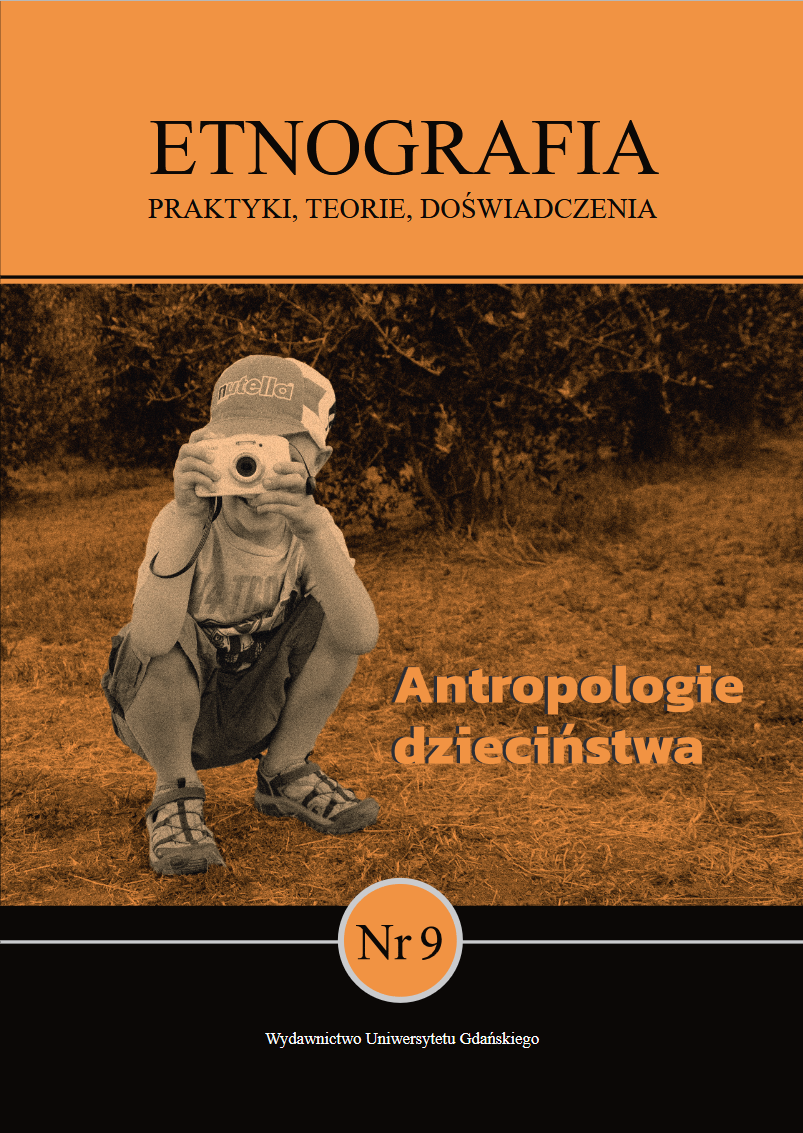Przejawy solidarności wśród dzieci w drodze. Co ma do tego „kryzys”?
DOI:
https://doi.org/10.26881/etno.2023.9.13Słowa kluczowe:
migrant children, care, crisis, border regime, solidarityAbstrakt
In “Emergent Solidarities and Children on the Move: What’s ‘Crisis’ Got to Do with It?” Rachel Rosen explores the concept of ‘crisis’ through the experiences of migrant children in the UK. Using participatory research with young migrants, Rosen argues that while border regimes categorize these children as ‘at risk’ or ‘risky,’ they are not passive victims. Instead, they engage in acts of solidarity, offering care and support to each other in the face of limited access to state services. Rosen posits that narratives of crisis, while often exclusionary, can also catalyze new social networks and forms of solidarity among young migrants. Through shared experiences, these youth not only resist marginalization but forge alternative networks that challenge xenophobic crisis narratives and state-sanctioned exclusions. By re-examining 'crisis' as both a restrictive and potentially generative framework, Rosen suggests that these solidarities reveal transformative possibilities for rethinking care, support, and belonging in the context of migration.
Downloads
Bibliografia
Adichie, Ch.N. (2022). The danger of a single story. Nagranie z października 2009. TED video, 18:49. https://www.ted.com/talks/chimamanda _ngozi_adichie_the_danger_of_a_single_story/transcript [dostęp: 27.07.2022].
Aitken, S. (2001). Global crises of childhood: Rights, justice and the unchildlike child. Area 33, No. 2, 119–27. https://doi.org/10.1111/1475-4762.00015.
Anderson, B. (2016). Against fantasy citizenship: The politics of migration and austerity. Renewal: A Journal of Labour Politics, Vol. 24, No. 1, 53–62.
Chandra, S., Toor S. (2014). Introduction [Special Issue on Solidarity]. Women’s Studies Quarterly. Vol. 42, No. 3/4, 14–24. https://www.jstor.org/ stable/24364987 [dostęp: 28.06.2022].
Dadus, D., Mudu, P. (2022). Care without control: The humanitarian industrial complex and the criminalisation of solidarity. Geopolitics, Vol. 27, No. 4, 1–26. https:// doi.org/10.1080/14650045.2020.1749839.
Dean, J. (1996). Solidarity of Strangers: Feminism after identity politics. Berkeley, CA: University of California Press.
De Genova, N.P. (2002). Migrant “illegality” and deportability in everyday life. Annual Review of Anthropolology, Vol. 31, No. 1, 419–447. https://doi.org/10.1146/ANNUREV. ANTHRO.31.040402.085432.
Dowling, E., Harvie, D. (2014). Harnessing the social: State, crisis and (big) society. Sociology, Vol. 48, No. 5, 869–886. https://doi.org/10.1177/0038038514539060.
El-Enany, N. (2020). (B)ordering Britain: Law, race and empire. Manchester: Manchester University Press.
Featherstone, D. (2012). Solidarity: Hidden histories and geographies of internationalism. London: Zed.
Fiddian-Qasmiyeh, E. (2018). Ideal women, invisible girls? The challenges of/to feminist solidarity in the Sahrawi refugee camps. W: R. Rosen, K. Twamley (red.), Feminism and the politics of childhood: Friends or foes? (s. 91–108). London: UCL Press.
Gonzales, R.G. (2011). Learning to be illegal: Undocumented youth and shifting legal contexts in the transition to adulthood. American Sociological Review, Vol. 76, No. 4, 602–619. https:// doi.org/10.1177%2F0003122411411901.
Gordon, M. (2020). Bordering through “Crisis”: Migrant journeys, border industries and the contestation of control. Migration, Mobility & Displacement, Vol. 5, No. 1, 39–58. http:// dx.doi.org/10.18357/mmd51202019626.
Gulli, M., Mirfat, R. i Z. (2020). Two Conversations. Children Caring on the Move, 28 February. https://ccomstudy.com/index.php/2020/02/28/ two-conversations [dostęp: 27.07.2022].
Guyer, J.I. (2007). Prophecy and the near future: Thoughts on macroeconomic, evangelical, and punctuated time. American Ethnologist, Vol. 34, No. 3, 409–421. https://doi.org/10.1525/ ae.2007.34.3.409.
Harvey, D. (2007). A brief history of neoliberalism. Oxford: Oxford University Press.
Humphris, R., Sigona, N. (2017), Outsourcing the “best interests” of unaccompanied asylum-seeking children in the era of austerity. Journal of Ethnic and Migration Studies, 1–19. https://doi.org/10.1080/1369183X.2017.1404266.
Jones, R. (2015). The end game: The marketisation and privatisation of children’s social work and child protection. Critical Social Policy, Vol. 35, No. 4, 447–469. https://doi.org/10.1177%2F0261018315599333.
Kriss, S. (b.d.). Building Norway: A critique of Slavoj Žižek. W: Idiot, Joy, Showland. https://samkriss.com/2015/09/11/building-norway-a-critique-of-slavoj-zizek [dostęp: 27.07.2022].
Kritzman-Amir, T. (2011). Privatization and delegation of state authority in asylum systems. Law and Ethics of Human Rights, Vol. 5, No. 1, 194–215. https://doi.org/10.2202/1938-2545.1057.
Lems, A., Oester, K., Strasser, S. (2020). Children of the crisis: Ethnographic perspectives on unaccompanied refugee youth in and en route to Europe. Journal of Ethnic and Migration Studies, Vol. 46, No. 2, 315–335. https://doi.org/10.4324/9781003206132.
Mezzadra, S., Neilson, B. (2013). Borders as method, or, the multiplication of labor. Durham, NC, London: Duke University Press.
Mohanty, Ch.T. (2003). “Under Western eyes” revisited: Feminist solidarity through anticapitalist struggles. Signs: Journal of Women in Culture and Society, Vol. 28, No. 2, 499–535. https://doi.org/10.1086/342914.
Narotzky, S., Besnier, N. (2014). Crisis, value, and hope: Rethinking the economy. Current Anthropology, Vol. 55, dodatek No. S9, S4–S16. https://doi.org/10.1086/676327.
Newth, G. (2021). Rethinking “nativism”: Beyond the ideational approach. Identities, online first, https://doi.org/10.1080/1070289X.2021.1969161.
Papadopoulos, D., Tsianos, V.S. (2013). After citizenship: Autonomy of migration, organisational ontology and mobile commons. Citizenship Studies, Vol. 17, No. 2, 178–196. http://dx.doi.org/10.1080/13621025.2013.780736.
Royston, J., Lazarus, B., Perrin, B. (2016). Prioritising the “kids”: Calais Jungle’s real children desperate for new UK life elbowed out of the way by migrant “minors” twice their size. The Sun, 19 października.
Rosen, R., Crafter, S. (2018). Media representations of separated child migrants: From dubs to doubt. Migration and Society, Vol. 1, No. 1, 66–81. https://doi.org/10.3167/ARMS.2018.010107.
Rosen, R., Crafter, S., Meetoo, V. (2021). An absent presence: Separated child migrants’ caring practices and the fortified neoliberal state. Journal of Ethnic and Migration Studies, Vol. 47, No. 7, 1649–1666. https://doi.org/10.1080/1369183X.2019.1608167.
Rosen, R., Chase, E., Crafter, S., Glockner, V., Mitra, S. (2023). Introduction: Crisis for whom? Global border regimes, minorisation, (im)mobility and care. W: R. Rosen, E. Chase, S. Crafter, V. Glockner, M. Sayani (red.), Crisis for Whom? Critical global perspectives on childhood, care and migration (s. 1–16). London: UCL Press.
Tassinari, A., Maccarrone, V. (2019). Riders on the storm: Workplace solidarity among gig economy couriers in Italy and the UK. Work, Employment and Society, Vol. 34, No. 1, 35–54. https://doi.org/10.1177%2F0950017019862954.
Tazzioli, M., Walters, W. (2019). Migration, solidarity and the limits of Europe. Global Discourse, Vol. 9, No. 1, 175–190. https://doi.org/10.1332/204378918X15453934506030.
Opublikowane
Jak cytować
Numer
Dział
Licencja
Czasopismo wydawane jest na licencji Creative Commons Uznanie autorstwa-Na tych samych warunkach 4.0 Międzynarodowe.

 Uniwersyteckie Czasopisma Naukowe
Uniwersyteckie Czasopisma Naukowe








